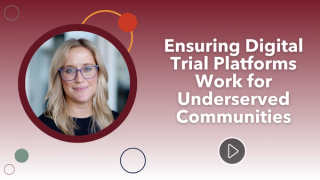
DEI
Latest News
Latest Videos

More News

In this video interview, Craig Lipset, co-chair, Decentralized Trials & Research Alliance (DTRA), discusses numerous themes that clin ops can focus on to keep its trials running efficiently and effectively.

Research collaboration between Tufts and the Society for Clinical Research Sites explores the prevalence of this belief in healthcare.

In this video interview, Craig Lipset, co-chair, Decentralized Trials & Research Alliance (DTRA), discusses how companies in the clinical research industry have been responding to recent political headwinds.

In this video interview, Craig Lipset, co-chair, Decentralized Trials & Research Alliance (DTRA), discusses how the current political climate is affecting diversity in clinical research and how diversity action plans may be impacted.

Recent research is showing medical treatment for pregnant women often relies on clinical data from non-pregnant female patient populations.

This year’s conference highlighted a number of critical areas in clinical R&D including financial management, representation, and eCOA.

Addressing systemic barriers and biases faced by women in research to foster a more diverse talent pool.

In this video interview, Iddo Peleg, CEO and co-founder at Yonalink, highlights the need for a satellite model in bringing clinical trials to more rural locations.

Ron Lanton, Partner, Lanton Law, discusses the impact of diversity bans and political challenges on the clinical trials industry.

In this video interview, Iddo Peleg, CEO and co-founder at Yonalink, shares his thoughts on the current climate of clinical research following NIH funding cuts and the removal of FDA diversity guidelines.

Recent actions by the FDA and NIH in response to the current political climate have left key stakeholders in clinical trials with limited resources to conduct equitable research.

In an interview with ACT senior editor Andy Studna at SCOPE Summit, Tenaerts, chief scientific officer, Medable, highlights the recent findings and how decentralized elements can improve access to underrepresented populations.

Conference breakout session examines the role of strategic partnerships in driving progress for sexual and gender minority inclusion in clinical research.

Clinical trial liaisons rather serve as experts in their therapeutic areas and as clinical trial specialists to provide a suite of strategic advantages to benefit a study.

Interactive panel on day 1 of SCOPE Summit 2025 highlighted the need for inclusive narratives, social listening to understand patient experiences, and the role of advocacy groups in opening doors to clinical trials.

Research from the Tufts Center for the Study of Drug Development’s PACT Consortium shows DCTs encourage higher participation across multiple demographic groups.

Investigators find that most exclusion criteria in critical care randomized clinical trials are justifiable, but 60% include at least one poorly justified exclusion, most commonly affecting pregnant or lactating individuals.

Daejin Abidoye, head of solid tumors, oncology development, AbbVie, discusses a number of topics around diversity in clinical research including industry’s greatest challenges in reaching diverse patient populations, personalized treatment methods, recruitment strategies, and more.

Recent research from the Tufts CSDD gauged progress in the context of the “Chief Diversity Officer��” role at top pharmaceutical companies.

While there has been a number of recent initiatives put into place to support diversity, equity, and inclusion in clinical trials, there is still a considerable amount of room for improvement.

Study finds that addressing racial disparities in lupus clinical trials requires targeted education, increased diversity among trial staff, culturally sensitive recruitment strategies, and addressing social determinants of health to improve Black patient participation.

In this video interview, Rachael Fones, director, government & public affairs, IQVIA, discusses some of the key ways that different trial sponsors may need support in meeting diversity expectations.

The complexities behind these translations require specialized personnel who are nuanced in both medical cultures.

In this video interview, Rachael Fones, director, government & public affairs, IQVIA, highlights the use of real-world data in setting population goals.

In this video interview, Rachael Fones, director, government & public affairs, IQVIA, discusses the importance of goal setting in the context of FDA’s latest Diversity Action Plan guidance.














